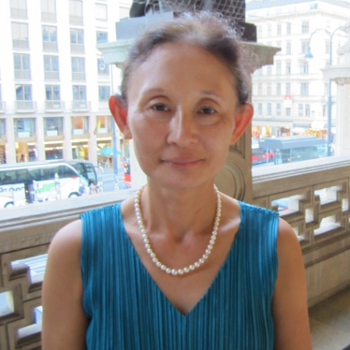The Metropolitan Opera’s legendary 1987 production of Turandot by Franco Zeffirelli is reminiscent of simpler times. The opera is a fantasy, a tale of “love conquers all”, set in a mythic time, in an exotic country. The production is a faithful recreation of that story, with no hidden directorial agenda nor any attempt to insert contemporary interpretations. It is extravagant, elaborate, colorful and over the top. The intricately decorated and brightly lit Imperial court in the middle of Act 2 never fails to elicit enthusiastic applause from the crowd, as was the case this evening. Zeffirelli’s original directions are still faithfully followed, with crowd movements, blocking of singers and actors on precarious steps and platforms, although they lack necessary dynamism and spontaneity that should accompany Puccini’s last and adventurous oeuvre.
The performance this evening got off to a rocky start as the orchestra, chorus and soloists seemed to be a bit out of synch in Act 1. Conductor Marco Armiliato was attentive to soloists throughout the evening, accommodating their sometimes idiosyncratic tempi while eliciting some fine performance from the orchestra. But the music sounded disconnected at times, and the sextet towards the end of the act lacked its memorable drama. Matters improved in Acts 2 and 3 as the soloists warmed up and the music turned more complex and at times lyrical. Throughout the evening, the best vocal performance came from the Met Opera Chorus. The praise of their emperor, and of the happy couple, ended the last two acts in thrilling unison as the audience began applauding once the curtain started to close while the music was still being played. Turandot is a perfect crowd pleaser at The Met, with spectacular scenery and costumes.
Christine Goerke brought some nuanced singing and acting to the title role. Her middle voice was secure and powerful. Turandot is a relatively short role, perhaps 20 minutes of singing, however the high tessitura of the role in her entrance aria “In questa reggia,” and in the final duet (completed by Franco Alfano), challenges many dramatic sopranos. Goerke coped well, with power to cut through the orchestra, although the top was at times a bit strained. Tenor Yusif Eyvazov, singing her ardent suitor Prince Calaf, was often overshadowed by Goerke’s superior musicality, but he brought down the house with his heartfelt rendition of “Nessun dorma”.
Puccini gave the slave girl Liù the most lyrical and memorable melodies to sing, as if to compensate for the role’s unrequited devotion for Calaf. Gabriella Reyes lacked delicate pianissimo in Liu’s Act 1 aria “Signore, ascolta”, but her creamy and strong voice was a perfect medium for her Act 3 scene of agony and self-sacrifice. Her farewell to Calaf before her suicide and Timur's moving lament, sung by the veteran bass James Morris, were the musical highlights of the evening. Smaller roles, including Ping (Hyung Yun), Pang (Tony Stevenson), Pong (Eric Ferring) and Emperor Altoum (Carlo Bosi) were well sung. Hopefully as the run continues, the performance will gain more consistency worthy of the spectacular production.




